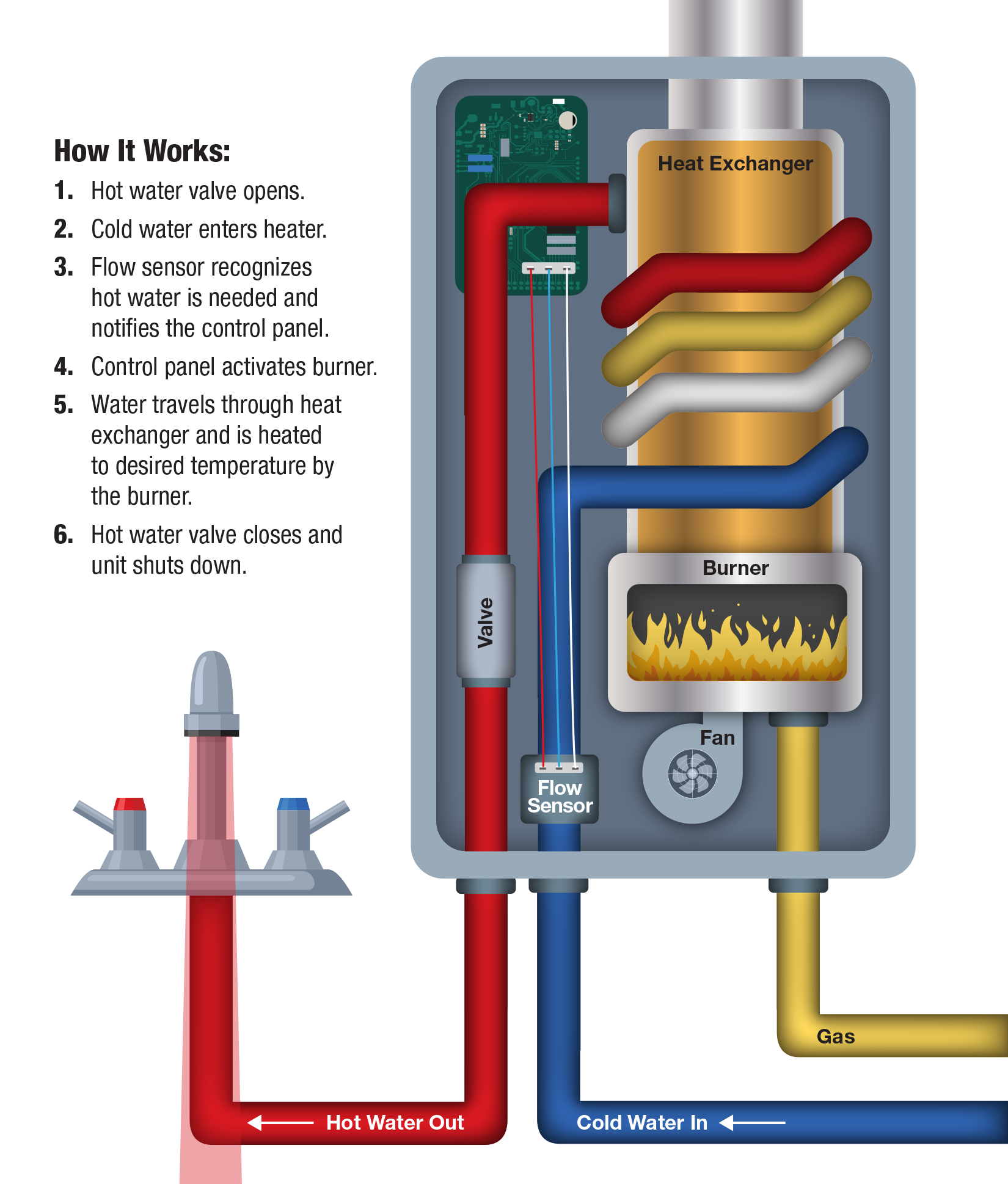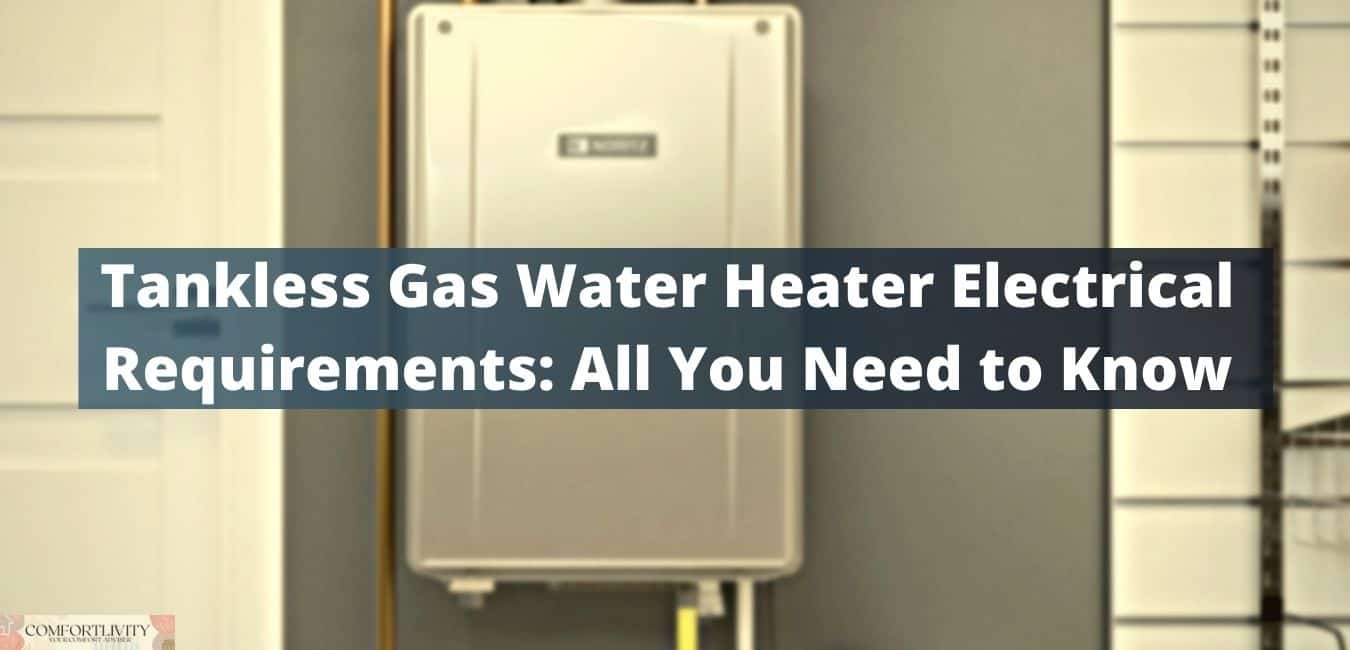tankless water heater electrical requirements
August 29, 2024
Published
January 29, 2023
How to Keep Your Tankless Water Heater at its Best | Oatey
Most Asked Questions
1. Why should I keep my tankless water heater well maintained?
NLP Answer: Proper maintenance of your tankless water heater is essential for ensuring its optimal performance and longevity. Neglecting maintenance can lead to efficiency issues, decreased lifespan, and potential breakdowns.
Expert Explanation: - Regular maintenance helps remove sediment and mineral build-up, which can hinder the heater's efficiency. - Ensuring proper air supply and venting prevents overheating and potential damage. - Maintenance extends the lifespan of components, reducing the need for costly repairs or replacements. - Ensures consistent hot water supply, avoiding inconveniences caused by heater malfunctions. - A well-maintained tankless water heater can reduce energy consumption and lower utility bills. - Regular maintenance can help identify and address issues before they escalate into significant problems. 2. How often should I maintain my tankless water heater?

NLP Answer: The frequency of maintenance for tankless water heaters may vary depending on factors such as usage, water quality, and manufacturer recommendations. However, it is generally recommended to schedule annual maintenance.
Expert Explanation: - Annual maintenance ensures that your tankless water heater remains in good working condition. - If you live in an area with hard water, more frequent maintenance may be necessary to prevent mineral build-up. - Following the manufacturer's guidelines is crucial, as they may provide specific recommendations for your particular model. - Regular maintenance intervals can help identify any potential issues early on and address them before they cause significant damage. 3. Can I perform maintenance on my tankless water heater myself?

NLP Answer: While some maintenance tasks can be done by homeowners, it is generally recommended to have a professional perform regular maintenance on your tankless water heater.
Expert Explanation: - Tankless water heaters have complex internal components that require professional expertise to handle effectively. - Professionals are trained to identify and fix potential issues accurately, ensuring your safety and proper functioning of the heater. - Hiring a professional also helps maintain any warranty requirements that may exist for your particular water heater. - DIY maintenance may lead to mistakes that could damage the system or void the warranty. - Professionals often have the necessary tools and equipment to carry out maintenance tasks properly. 4. What steps are involved in tankless water heater maintenance?

NLP Answer: Tankless water heater maintenance typically involves tasks such as flushing the unit, cleaning or replacing the filter, inspecting water and gas connections, and checking the overall system for any issues.
Expert Explanation: - Flushing the heater helps remove sediment and mineral buildup, which can negatively impact its performance. This should be done following the manufacturer's instructions. - Cleaning or replacing the filter ensures proper water flow and prevents debris from entering the system. - Inspecting water and gas connections ensures there are no leaks or loose fittings that could potentially cause damage or safety hazards. - Checking the overall system involves examining components, such as the heat exchanger, combustion chamber, and venting, for any signs of damage or wear. - The expert may also perform diagnostic tests to assess the heater's efficiency and make any necessary adjustments. 5. What are the common signs that indicate my tankless water heater needs maintenance?

NLP Answer: Several signs can indicate that your tankless water heater requires maintenance, including reduced water flow, fluctuating water temperature, strange noises, error codes on the unit's display, and increased energy consumption.
Expert Explanation: - Reduced water flow could be caused by mineral or sediment build-up in the pipes or clogged filters, necessitating maintenance. - Fluctuating water temperature may indicate problems with the heat exchanger, ignition system, or water flow, which require professional attention. - Strange noises like rattling, banging, or whistling may indicate mechanical issues that need addressing. - Error codes displayed on the unit should be consulted in the manufacturer's manual or addressed by a professional to diagnose the specific problem. - A sudden increase in energy consumption can be an indication of efficiency issues or system malfunctions, requiring maintenance. 6. Is it possible to prevent mineral buildup and prolong the lifespan of the tankless water heater?

NLP Answer: Yes, there are measures you can take to prevent mineral buildup and extend the lifespan of your tankless water heater, such as water softening, installing a water treatment system, and regularly flushing the unit.
Expert Explanation: - Water softening systems can help prevent mineral deposits, usually caused by hard water, from accumulating in the heater and other plumbing fixtures. - Installing a water treatment system, such as a water conditioner or descaler, can also help minimize mineral deposits and enhance the performance of your tankless water heater. - Regularly flushing the unit, at least once a year or as recommended by the manufacturer, helps remove any existing sediment or mineral buildup and prevents further accumulation. 7. Does a tankless water heater require a specific electrical setup?

NLP Answer: Yes, tankless water heaters typically have specific electrical requirements that need to be met for proper and safe operation.
Expert Explanation: - Tankless water heaters generally require a dedicated electrical circuit to handle the electrical load they draw. This may involve upgrading the electrical panel if necessary. - The electrical supply should match the requirements specified by the manufacturer, including voltage, amperage, and wire size. - It is crucial to involve a qualified electrician to ensure proper electrical setup, compliance with local codes, and safety. 8. Can I install a tankless water heater myself?

NLP Answer: While it is possible for some individuals with plumbing and electrical experience to install a tankless water heater, it is generally recommended to hire a professional plumber or HVAC technician due to the technical requirements and potential safety hazards involved.
Expert Explanation: - Installing a tankless water heater involves various technical considerations, such as proper venting, gas or electrical connections, and plumbing modifications. - Professionals have the expertise and experience to ensure accurate installation, compliance with codes and regulations, and safety. - Incorrect installation can lead to performance issues, safety hazards, and may void manufacturer warranties. 9. Are tankless water heaters more energy-efficient than traditional tank water heaters?

NLP Answer: Yes, tankless water heaters are generally more energy-efficient compared to traditional tank water heaters.
Expert Explanation: - Traditional tank water heaters continuously heat and store water, leading to standby heat loss and higher energy consumption. - Tankless water heaters only heat water on demand, resulting in energy savings as there is no need to constantly maintain a hot water supply. - Tankless water heaters can provide energy savings of up to 30%, contributing to lower utility bills and reducing environmental impact. 10. Do tankless water heaters require a backup power source during electrical outages?

NLP Answer: Tankless water heaters powered by electricity require a backup power source, such as a generator or battery backup, to continue functioning during electrical outages.
Expert Explanation: - Tankless water heaters rely on an electrical power supply for ignition, controls, and operation. - During power outages, an alternative power source is necessary to ensure the uninterrupted supply of hot water. - Backup power options, such as a generator or battery backup system, can be installed to support the tankless water heater during emergencies. 11. Can a tankless water heater supply hot water to multiple fixtures simultaneously?

NLP Answer: Yes, tankless water heaters are designed to supply hot water to multiple fixtures simultaneously based on their flow rates and the unit's capacity.
Expert Explanation: - Tankless water heaters come in different sizes and capacities, with each model having a maximum flow rate it can handle. - The simultaneous use of multiple fixtures, such as showering while running a dishwasher, should be within the heater's capacity to ensure sufficient hot water supply. - Proper sizing and assessment of the household's hot water needs are necessary to determine the appropriate tankless water heater capacity. 12. Can a tankless water heater be installed outdoors?

NLP Answer: Yes, certain tankless water heater models are designed for outdoor installation, providing flexibility and space-saving options for homeowners.
Expert Explanation: - Outdoor tankless water heaters are specifically built to withstand the elements and have proper venting requirements for outdoor use. - Outdoor installation eliminates the need for additional venting or vent pipes inside the house, saving space and installation costs. - However, local building codes and regulations should be considered when determining if outdoor installation is permissible in your area.